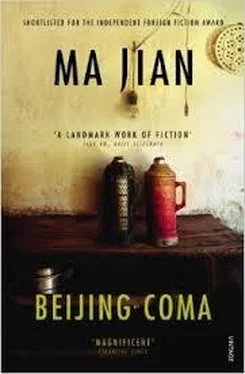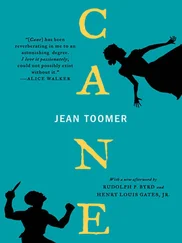You drift onwards through your cerebellum, weaving through the scaffold of a billion star-shaped glial cells.
‘The police called me into the station this morning,’ my mother says. ‘They said that, if I promise not to speak to any foreign journalists or tell anyone about my son’s injury, I can apply for a hardship allowance.’
She has three visitors today: Zhu Mei, who came round last week, An Qi, and another woman whose voice I don’t recognise. All three of them have joined the ‘Tiananmen Mothers’, an underground group founded by a professor called Ding Zilin whose seventeen-year-old son was killed in the crackdown.
Zhu Mei has brought a box of hairtail fish. My mother is very pleased to have some fish. She seldom gets a chance to go to the market.
‘How much will they give you?’ asks An Qi.
‘About ninety yuan a month,’ my mother shouts from the kitchen as she drops the hairtail fish into a wok of hot oil. ‘It will only cover two days’ worth of his intravenous solution.’
‘They gave me a one-off payment of two hundred yuan after my husband was shot,’ Zhu Mei squeaks in her high-pitched voice. ‘They said that now he’s dead, I shouldn’t speak about him again.’
A man and a woman are walking up the stairwell. I listen to the click of the woman’s heels and the dull thump of the man’s rubber soles as they hit the concrete steps. I’m terrified the police might turn up and discover my mother talking to these women.
‘We’ve now found seventeen people who are prepared to state they lost relatives during the crackdown. Professor Ding said that we should submit a joint letter to the government demanding a public account of the killings.’ This woman has never visited before. She sounds as though she’s in her early thirties, and speaks in the breathy, monotone drone typical of bereaved women.
‘Our local police aren’t too bad,’ An Qi says. ‘They said that the government should have better things to do than pick on people like us. They advised us to move to a different town, somewhere no one will recognise us.’
‘Don’t be duped,’ my mother says, coming in from the kitchen. ‘Your personal files will follow you wherever you go.’ The charred smell of the noodles she burned last night still wafts from her hair.
‘Professor Ding wasn’t allowed to attend the United Nations conference on human rights,’ An Qi says. ‘But the written statement she submitted at least exposed the suffering that relatives of the dead have endured.’
‘My son’s still alive,’ my mother reminds them.
‘So is my husband,’ says An Qi. ‘But that’s no reason not to get involved.’
‘Professor Ding sounds like a very brave woman,’ my mother says. ‘I should pay her a visit. Is that the list you’ve drawn up of people killed during the crackdown? How many names have you got?’
‘One hundred and fifty-two,’ the young woman says. ‘The eldest victim was fifty-six, the youngest was only nine.’
‘I can’t see a thing without my glasses,’ my mother mutters. ‘Look how dry my hands are! I must rub some more Vaseline on them. Spring Festival’s coming up soon. I wanted to repaint the walls and tidy the flat up a little.’
‘Have we got a photocopy of the list?’
‘I don’t need one,’ An Qi says. ‘I’ve memorised every name, so even if the police confiscate the list from me, I’ll still have a copy of it in my mind.’
‘Huh, we’re just a few middle-aged women. What can we hope to achieve?’
‘Well, China lost its Olympic bid because of its human rights record. That shows our appeals haven’t gone unheard…’
Memories spiral around me, sometimes crossing paths, sometimes colliding. I picture the dusty string of garlic hanging from a peg on the kitchen door; my father squatting down beside a washbowl, rubbing his bare legs with a wet cloth; a swathe of fallen bicycles sparkling in the sun like a field of wheat. The images float off into the air that is filling with greasy fumes and the smell of fried fish. Perhaps today is the day that my brain will stop thinking and my life will at last come to an end.
You want to climb onto the back of the Yingzhao beast — that winged horse with a human face — and fly through the Emperor of Heaven’s grasslands.
Our broadcast station tent looked like an earthquake shelter. In the early afternoon, the sun beat down from overhead, and it became so hot and stuffy inside that everyone’s faces turned scarlet. A heavy stench of diesel from the generator hung in the humid air, together with a faint scent of seaweed wafting from the box of sushi a Japanese woman had given us. The sushi was delicious. Although I was still full from lunch at the Beijing duck restaurant, I managed to gobble down five or six pieces. The rule about not eating in the Square seemed to have been abandoned.
Everyone was busy sorting out pamphlets and writing news scripts. I spotted Old Fu lying asleep on the ground with a cardboard sign around his neck that said COMMANDER-IN-CHIEF OF THE HUNGER STRIKE HEADQUARTERS.
‘So you’re back in charge, are you?’ I laughed, leaning down and waking him up.
‘Bai Ling’s been rushed to hospital again. I had to take over the reins.’
‘Lin Lu is Bai Ling’s deputy, so surely he should have taken over,’ I said, lighting a cigarette. ‘And by the way, why didn’t you and Mou Sen go to that televised meeting with Li Peng?’
‘Neither of us were around when the officials came to collect the student leaders,’ he said.
‘There are rumours flying about that lots of the cash that’s been donated has gone missing,’ I said.
‘Yes, it’s a big problem. I’m only going to hand out money for food from now on. We must wait until we have a proper accounting system set up before we give money for anything else.’ Old Fu sat up and stared at his feet.
Chen Di, who was sitting next to him, said, ‘We’ll need to buy some more broadcast equipment.’ He’d given up his hunger strike, so he had more energy now to look through the scripts.
‘There are donation boxes all over the Square, but the ones outside the two broadcast stations get most of the money,’ I said. ‘This place and the Beijing Students’ Federation must have collected a million yuan by now.’
Mou Sen walked into the tent. ‘It’s no good,’ he said. ‘The militants are taking over. Lin Lu is reorganising the Square without bothering to consult the Beijing Students’ Federation.’ He’d been given a transfusion in the emergency tent. His left arm was red and swollen.
‘I’ve just had lunch with our Southern University gang,’ I told him. ‘Wang Fei wants to set up a national student association.’
‘That’s a good idea,’ Mou Sen said. ‘We can’t allow Lin Lu to monopolise things. He’s behaving like a tyrant.’
‘Wang Fei is a despot as well,’ Chen Di said, filing away a script that had just been broadcast.
Nuwa walked out from behind the amplifiers. ‘I wish you’d give up the hunger strike now,’ she said, glancing at Mou Sen. ‘There’s no need to starve yourselves to death. The Beijing Medical Rescue Centre has told us that another five hundred hunger strikers have passed out. Most of them are suffering from diarrhoea and dehydration. I really think it’s gone far enough now.’ I was surprised she hadn’t come to Wang Fei’s defence after Chen Di had called him a despot.
‘Broadcast that information at once,’ Mou Sen said. ‘If we don’t, the Voice of Qinghua will, or the Voice of the Student Movement as they now call themselves.’ Mou Sen was a very conscientious editor. He’d become much more cautious about what material he chose to air since he’d broadcast the false rumour about Deng Xiaoping’s resignation.
Читать дальше












